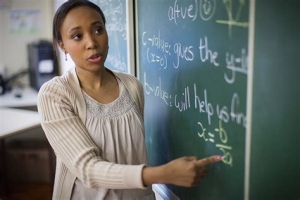Pieter Mostert | My New Teacher

Teachers are adults. It is one of the hidden assumptions when we talk about teaching: it is something adults do. The aims of teaching, the challenges and rewards, the difficulties and strategies to overcome them – they’re all conceived and considered from the perspective of adults.
For me teaching had a different start. It happened a while ago, 56 years, I was 11. My mother told me that two mornings a week I would be in her class. “I can use some help”, she said, having 44 children and facing the task to teach them how to read, write and do calculus. I would help them with the calculus. “You’ll be there to help them”. I still remember how it felt, with my knees on the wooden floor of the classroom so that I faced the pupils at eye level. A teacher helps; pupils find certain things difficult and a teacher is there to help them. That experience shaped my view and practice of teaching for the next decennia. Teaching = helping – you just have to figure out what it will actually help. 25 Years later I finished my PhD. Basically it is about the same question: when teaching philosophy, what does help?

I had this flash back some time ago, when I became a ‘lesson 1 student’ again. It felt like entering a school for the first time: the awe and nervousness that here it is going to happen. This time it was a small village church and I entered for my first lesson in bell ringing. I also entered a new vocabulary, as if overnight the things had gotten different names. I heard about sally & coil, hand stroke & back stroke, ringing up & ringing down. I understood that there are 5 levels and that on an average it takes a year and a half to complete level 3.
Alex is my teacher; he is 16 and I am his first student. We get along very well. I try to be a good student and he tries to become a good teacher. But actually, he already is a good teacher. He clearly explains what I have to do, observes my doing – or at least my attempts to do what I’m supposed to do, points at the things I’m doing right and addresses the things that need improvement. He’s very to the point: my right hand here, my left thumb there, a bit slower here, a bit faster there. The bells are muffled, so there is no noise which could distract me or irritate the neighbours on a Monday evening.
Alex tells me there are two schools in the teaching of bell ringing. I’m not surprised; take any subject and there are different schools in how it should be taught. School A – let’s call it “the school of realistic experience” – encourages the actual bell ringing as early as possible in the learning process. Technical / physical ‘corrections’ will be achieved during this process. School B – ‘the school of technical perfection” – disapproves of this approach. First a student should acquire a solid level of technical and physical mastery of ‘handling’ the rope, before entering the complexities of bell ringing. Alex represents school B, evidently.
Is bell ringing a complex activity? After six lessons I am convinced it is, as – despite its name – it is not about ringing a bell, but about ‘change ringing’. Change ringing, Wikipedia explains, is “the art of ringing a set of tuned bells in a tightly-controlled manner to produce precise variations in their successive striking sequences, known as ‘changes’.” I am very happy not being bothered by those complexities at this stage of my learning. Simple ‘rope management’ is complex enough.

“But why is there a school A?”, I asked two (adult) teachers. Their answers were straight forward: new learners want to be motivated and promising them that soon they will be able to start bell ringing motivates them.
Alex, on the contrary, thinks that motivation is not his job, but mine. He tries to be as specific as possible about what I have to do, how I have to do it, what I already do correctly, what I can improve and how I can do that. His language is clean and shows a fine understanding of how bell ringing should be done. His language is observational and precise. Openly he talks about the mistakes he now and then makes. But my own motivation I have to manage myself, not he – I agree.
I sense a joy of simplicity: I learn bell ringing and Alex teaches me how to do that properly, step by step. It’s a clean situation, in which Alex and I can speak a clean language.
Afterwards we chat, about what I learned and how I can help him with his German. A few basics about the past tense in German were missing, I spotted.
What a joy it is to have a non-adult teacher! Maybe that is what’s motivating me to ride my bike up the hill and stand there with a rope in my hands for an hour and a half.
Pieter Mostert, Lincoln, October 2019
Posted by on 5th November 2019 at 12:00am
Category: Education




